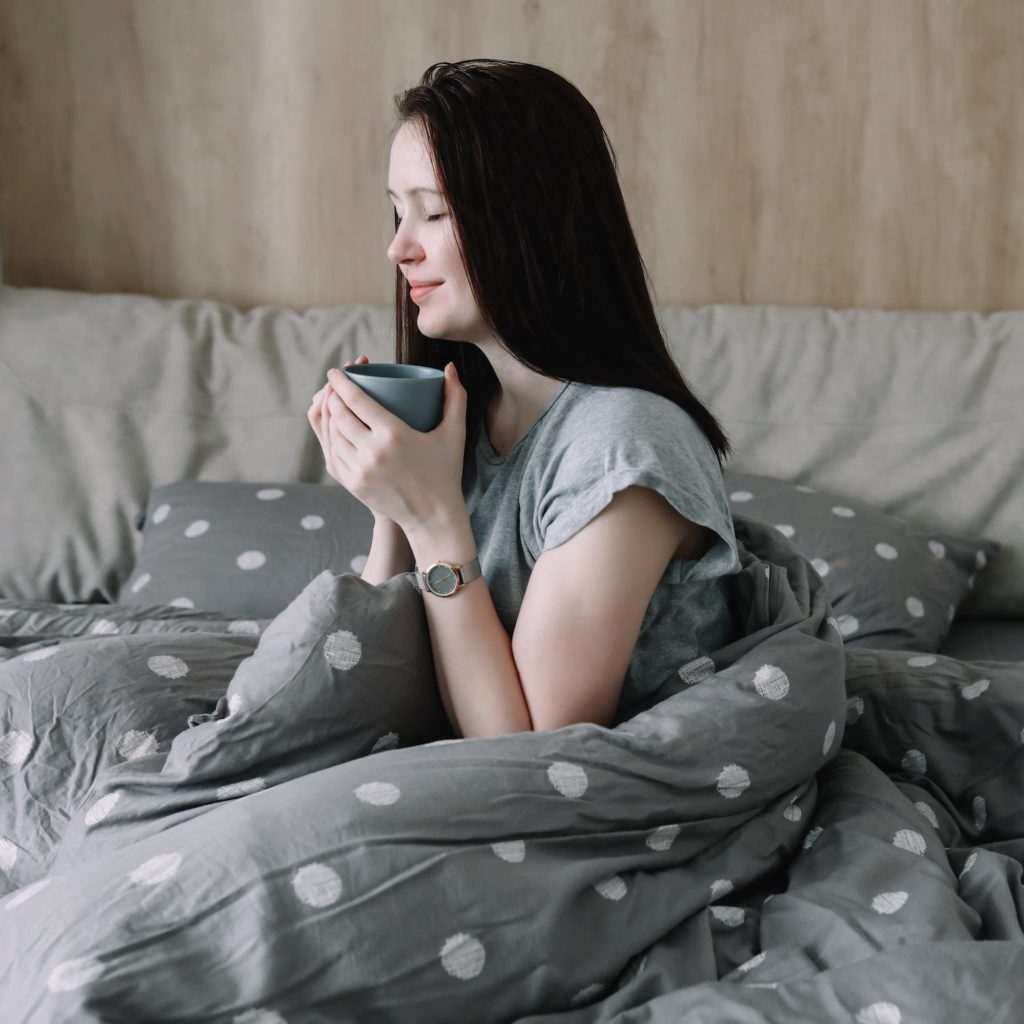There’s nothing like a warm cup of tea to help calm your nerves. And while many of you may pick up a cup of tea to help give you a boost during the day, do you ever drink tea to help you sleep? There are so many different kinds of tea out there— and many can even help you get a better night’s sleep!
What Teas Are Good For Sleep?
Herbal tea is a popular choice for sleep because it has little or no caffeine in it— as opposed to something like black tea, which is almost as caffeinated as coffee. Below I’ll share a list of my favorite nighttime teas, many of which in addition to helping you sleep, have other health benefits.
Note: While these teas have been shown to have a positive effect on sleep and relaxation, the research is continually evolving and we’ll report more here as we continue to explore tea’s full effect on your sleep.
Chamomile Tea
The chamomile flower has been used medicinally for thousands of years, treating everything from hay fever and gastrointestinal discomfort to wounds and insomnia.
While research is limited on the topic, drinking chamomile tea has been shown to improve sleep quality. Chamomile’s calming effect is thanks to a flavonoid called apigenin. This compound binds itself to your brain’s benzodiazepine receptors, which can help decrease anxiety and induce sleep.
If “benzodiazepine receptors” sound familiar to you, that’s because benzodiazepine medications including Xanax are often used to treat anxiety.
Research shows that postpartum women who drink chamomile tea report a reduction in depression symptoms as well as improved sleep quality. Similar results were found in older adults, who reported better sleep quality than the control group that did not drink chamomile tea.
Lavender Tea
We all know lavender by its distinctive purple flowers and its rich, mellow scent. It’s a familiar sight here in Southern California, and I even grow it in my own garden. While more often used in aromatherapy, lavender flowers can also be used to make a relaxing tea that can help you get restful sleep.
Lavender’s sleep-inducing properties include interacting with the neurotransmitter GABA (gamma-aminobutyric acid) to help quiet your brain and get you to sleep easier. It also works as an anxiolytic, or as an anxiety reliever and mild sedative. Aromatherapy using lavender oil before bed may increase time spent in deep, slow-wave sleep— which is what you want! Slow-wave sleep is where the most rejuvenating sleep of the night takes place.
Valerian Root Tea
Like chamomile, valerian root also has a long history of medicinal usage, particularly with stress and anxiety. Valerian root can help you fall asleep more quickly and increase your sleep quality. Made from the dried valerian herb, valerian tea has a very distinctive taste and smell that may be off-putting for some— myself included. You can add some honey, almond milk, or maple syrup to help improve the taste.
Valerian root is often combined with other herbs with calming effects, such as hops— which are commonly used in beer. When taken as a supplement or consumed as a tea, valerian increases the GABA levels in your brain to lower anxiety and boost feelings of calmness and relaxation.
Valerian root helps you fall asleep thanks to two naturally occurring sedatives in the herb, called valepotriates and sesquiterpenes. However, it’s important not to consume valerian root tea with certain medications or supplements, such as benzodiazepines like Xanax or barbiturates like morphine, as they may create adverse effects when taken together.

Green Tea
Drinking green tea throughout the day rather than at night may be helpful for reducing fatigue and increasing sleep quality. This is because of a compound in green tea called theanine, which helps your brain relax by reducing stress-related hormones and neutron excitement. Just make sure it’s low-caffeine though— some blends of green tea, such as matcha, have high caffeine content and may keep you awake if you drink it too late.
Green tea’s benefits for your brain are not only great for your mental health, but they’re also great for your sleep health, especially if you have sleep apnea. Sleep apnea’s characteristic intermittent breathing pauses can deprive your brain of oxygen and prevent it from restoring itself overnight like it’s supposed to. However, drinking green tea during the day may help prevent the cognitive problems that sleep apnea can bring, as well as help you get a more relaxing night’s sleep.
The polyphenols— compounds that boost digestion and brain health— in green tea can also reduce inflammation and oxidative stress in your body, as well as help promote weight loss.
Passionflower Tea
Passionflower tea has a similar effect on the body as chamomile tea does. Like chamomile, passionflower can help reduce anxiety in your brain, thanks to its flavonoids binding to your brain’s benzodiazepine receptors.
Some research has found that when combined with other herbal supplements like valerian, passionflower is just as effective in short-term insomnia relief as traditional sleep aids. However, this study used capsules rather than tea— the tea is less concentrated than the capsules, but it should still have a positive effect on your sleep.
Magnolia Bark Tea
Like other herbs listed here, magnolia bark has been used as a sleep aid for thousands of years. Its primary compound, honokiol, binds to GABA receptors in your brain, which helps reduce the time it takes for you to fall asleep.
Similar to valerian root tea, it may have an unpleasant taste to some. However, the tea can be sweetened with honey or maple syrup if you’re not a fan of the taste.
Some have reported that magnolia bark has increased wakefulness during the night, however, the time it takes to return to sleep is significantly reduced.
Other Teas That May Help Sleep
The above-listed teas have notable sleep-boosting properties, but there are other popular teas out there that can help promote a good night’s sleep too. However, these blends need additional research to discover what in particular about them is helpful for sleep.
Lemon Balm Tea
Did you know lemon balm is actually a member of the mint family? Lemon balm is most often consumed as tea and as an essential oil, and it’s commonly used as both an antibacterial agent to treat infections, as well as to treat sleep problems.
Drinking lemon balm tea at night may reduce symptoms of insomnia, as well as symptoms of anxiety, depression, or restlessness.
Ginger Tea
Ginger is a bright and fragrant root most often used in our kitchens, but it can also be used to make a refreshing and healthy tea.
Ginger’s health benefits are well-documented, and consumed in any form it’s great for treating nausea and sore throats. It’s also an anti-inflammatory food and is rich in antioxidants. Ginger tea is a naturally caffeine-free beverage, so it won’t interfere with your sleep if you drink it before bedtime.
Lemongrass Tea
Before we go any further, I want to clarify that while the two have similar names and flavors, lemongrass and lemon balm are not the same thing. Remember— lemon balm is a leafy herb in the mint family, and lemongrass, as its name suggests, is a woody and tall grass with flavorful and aromatic underlayers.
Lemongrass is an old folk remedy that’s been used to promote sleep, boost immunity, and relieve pain. It’s often used in Asian cuisine, as well as in a refreshing tea. Fun fact: lemongrass is also known as citronella, which is a common and popular ingredient in insect repellants.
As well as being used to promote healthy rest, lemongrass has antioxidant, anti-inflammatory, and antimicrobial properties. It may also promote healthy digestion and healthy cholesterol levels.
Mint Tea
This is another familiar scent and flavor for everyone. Mint tea or peppermint tea is naturally caffeine-free, which can help you wind down for a good night’s sleep without keeping you awake.
Mint tea is also amazing for easing an upset stomach and may help relieve allergies and congested sinuses. Thanks to the cooling menthol, it can also keep your breath feeling fresh.
If you’re looking for a great mint tea or other herbal teas, I recommend those made by Pique Tea. These teas are high in those amazing polyphenols that can keep your body and your brain feeling healthy. They’re also free of any toxins or pesticides found in many plants including some tea leaves, and they can be enjoyed anywhere— whether you’re at home or on the go.
Is There a Best Tea for Sleep?
While there are many kinds of tea out there that can help promote sleep, what may work best for you may not work at all for someone else. Since this is the case, having such a variety of options can really be a blessing— if one type of tea doesn’t work for you, another likely will.
If you’ve added nightly tea to your routine, give this a try to see if you’re actually enjoying its benefits, rather than a placebo:
- Go one night without drinking your tea of choice to establish a baseline for your sleep.
- The next night, drink your nightly tea as scheduled to see how you feel afterward.
- The following night, go without drinking your tea as you did the first night. This is so you can compare how you felt with the tea in your system as well as without, and observe any key differences.
Drinking tea by itself will not guarantee a good night’s sleep— you need to maintain proper sleep hygiene and a consistent sleep schedule to really get the most help from your nightly cup of tea. But if you want an extra boost to your sleep, the right cup of tea may work wonders for you.
Tea doesn’t just have to be a morning or afternoon pick-me-up— it can be a great nightcap too.
Ask the Sleep Doctor
Have questions about sleep? Submit them here! We use your questions to help us decide topics for articles, videos, and newsletters. We try to answer as many questions as possible. You can also send us an email. Please note, we cannot provide specific medical advice, and always recommend you contact your doctor for any medical matters.


